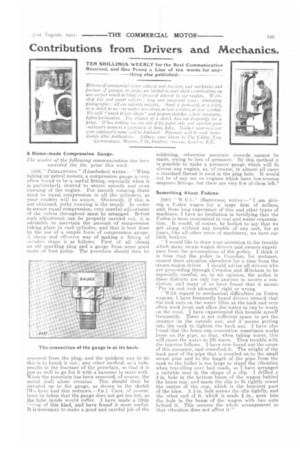Contributions from Drivers and Mechanics.
Page 17

If you've noticed an error in this article please click here to report it so we can fix it.
TEN SHILLINGS WEEKLY for the Best Communication Received, and One Penny a Line of ten words for anything else published.
Drivers of commercial-nmtor vehic.es and tra:tors, and mechanics and foremen y garages or shops, are invited to send short contributions on any subject whtch is likely to prove of interest to our readers. We.rk. shop lips and smart rep.iirs ; long and successful runs ; interesting photographs: all arc suitable subjects. Send a post-card, or a letter, or a sketch to us—no ;natter how short, or how written, or Jaw worded. We will "knock it into shape" and prepare sketches, where necessary, before publication. The 46.sence of a sketch does not disqualify for a prize. When writing use one side of the paper only and mention your employer's name as a guarantee of bona fides. Neillur your own nor your employer's name will be disclosed. Payment will be 'node immediately after publication. Address your letters to The Editor, Tua
CommEucIAL Morou, 7-15, kosebery Avenue, Lomboi, E.C.
A Home-made Compression Gauge.
The sender of the following communication has been awarded the 10s. prize this week.
[919) " PEIRIANYDDA " (Llandudno) writes:" When tuning up petrol motors, a compression gauge is very often found to be a useful fitting, especially when it is particularly desired to secure smooth and even running of the engine. For smooth running there must be equal compression in all the cylinders, as your readers will be aware. Obviously, if this is not obtained, jerky running is the result. In order to secure equal compression, very careful adjustment of the valves throughout must be arranged. Before such adjustment, can be properly carried out, it is advisable to ascertain the amount of compression taking place in each cylinder, and that is hest done by the use of a simple form of compression gauge. A.. cheap and effective way of making a fitting of simitable shape is as follows. First of all obtain an old sparking plug and a gauge from some good make of foot pump. The porcelain should then be removed from the plug, and the quickest 'way to do this is to break it out ; any other method, as a rule, results in the fracture of the porcelain, so that it is just as well to go for it with a hammer to start with. When the porcelain has been removed, of course, the metal shell alone remains. This should then be sweated on to the gauge, as shown in the sketch [We have had this redrawn.—En.] Care, of course, must be taken that the gauge does not get too hot, as the tube inside would suffer. I have made a little 4 tring of this kind, and have found it most useful. It is necessary to make a good and careful job of the
soldering, otherwise accurate records cannot be made, owing to loss of pressure. By this method it is possible to make a pressure gauge which will fit almost any engine, as, of course, in almost all cases a standard thread is used in the plug hole. It would not be of any use on engines which have low-tension magneto fittings. but there are very few of them left."
Something About Fodens.
W.E.C." (Battersea) writes :—" I am driv. ing a Foden wagon for a large firm of millers, and, from long experience of this and other types of machines, I have no hesitation in testifying that the Foden is most economical in coal and water consumption. It would, of course, be foolish to say that we get along without any trouble of any sort, for at times, like all other users of machinery, we have our little bothers.
" I would like to draw your attention to the trouble which many steam-wagon drivers and owners expefience from the prosecutions of the police. I think it is time that the police in Croydon, for instance, turned their attention elsewhere for a time from the steam-wagon driver. I should advise all drivers who are proceeding through Croydon and Mitcham to be especially careful, as, in my opinion, the police in these districts are only too anxious to secure a conviction, and many of us have found that it means Pay up and look pleasant,' right or wrong.
"With regard to mechanical difficulties on Foden wagons, I have frequently heard drivers remark that the lock nuts on the water lifter at the tank end very often work loose and allow the water to run to waste on the road. I have experienced this trouble myself frequently. There is not sufficient space to get the spanner on the outside nut, and it means getting into the tank to tighten the back nut. I have also found that the brass cup connection sometimes works loose on the pipe, so that, when taking water, this will cause the water to lift warm. Then trouble with the injecl or follows. I have now found out the Cause of this nuisance, and remedied it. The weight of the back part of the pipe that is counled on to the small steam pine and to the length of the pipe from the tank to the boiler is too large to stand the vibration when travelling over bad roads, so I have arranged a suitable stay in the shape of a clip. I drilled a On. hole in the bottom beam of the wagon behind the brass cup, and made the clip to fit tightly round the centre of the cup, which is the heaviest part of the pipe. A f-in. bolt screws the clip tightly, and the other end of it, which is made in.. goes into the hole in the beam of the wagon with two nuts behind it. This secures the whole arrangement so that vibration does not affect it."


















